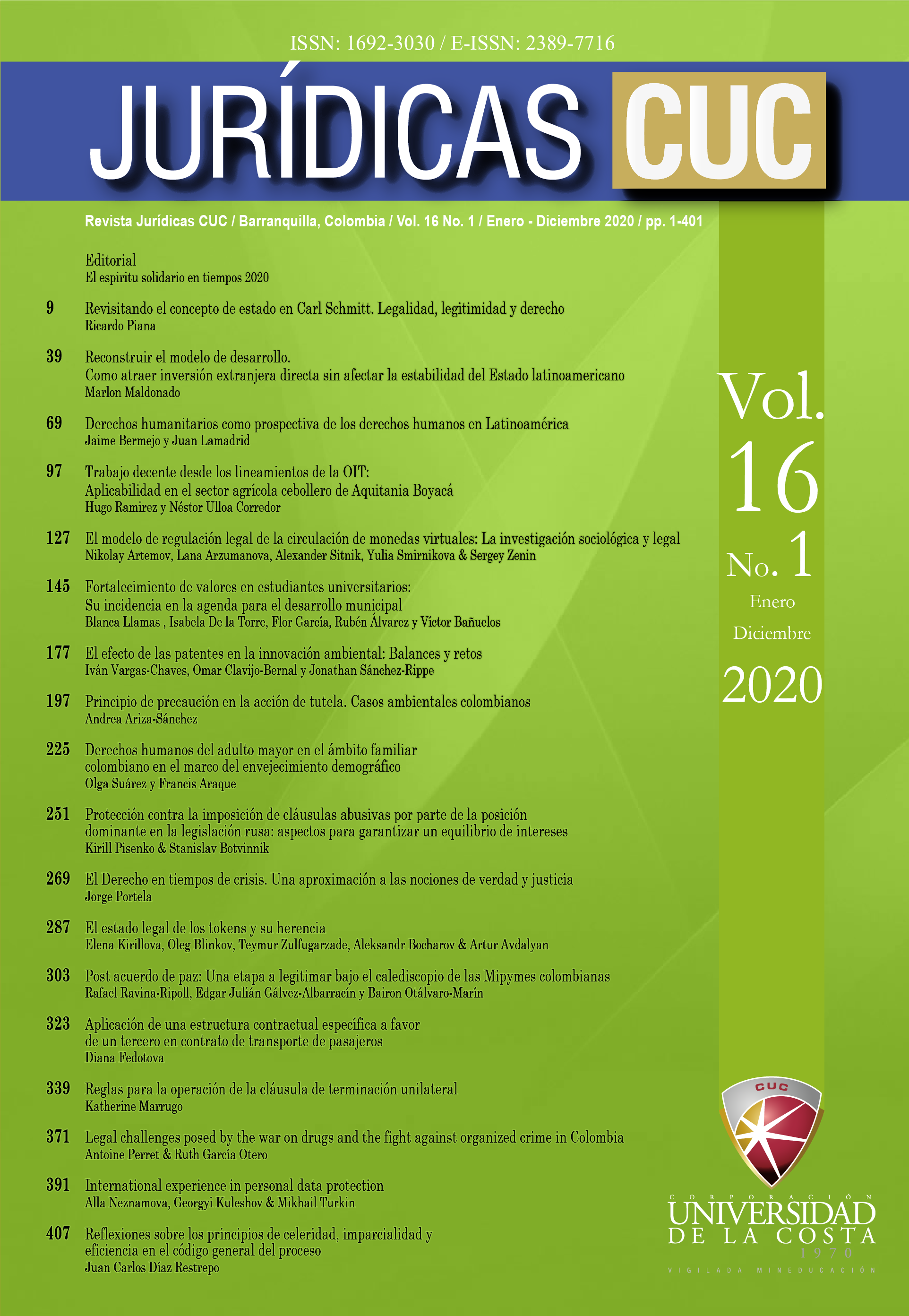The legal regulatory model of virtual currency circulation: A socio-legal study
DOI:
https://doi.org/10.17981/juridcuc.16.1.2020.05Keywords:
consumers, financial instruments, legal regulation, virtual currency, brokersAbstract
The article examines a model of legal circulation of virtual currency. The issue of the legal nature of virtual currencies remains controversial. This generates a problem of choosing the most suitable and effective approach to regulation of virtual currencies circulation. The article analyzes approaches to determining the legal nature of cryptocurrencies and the experience of state regulation in Switzerland, Japan, the USA and China. Methods of legal analysis, synthesis, specific scientific methods, and social research survey have been employed in this article. As a result of the conducted socio-legal study, it has been found that there is no unified strategy of legal regulation of virtual currencies, which affects their perception by recipients. This conclusion is based on the comparative analysis of legal regulation of cryptocurrencies circulation in such countries as Japan, the USA, and Switzerland. By contrast with these countries, China has significantly restricted usage of cryptocurrencies, actually having chosen the way of banning virtual currencies. The inconsistency of legal regulation can be observed not only between different countries, but also within one state, which is proved by the situation in the USA and Switzerland. At the present time, the system of government regulation of cryptocurrencies circulation is the most effective in Japan.
Downloads
References
Dwyer, G. P. (2015). The economics of Bitcoin and similar private digital currencies. Journal of Financial Stability, 17, 81–91. http://dx.doi.org/10.2139/ssrn.2434628
ElBahrawy, A., Alessandretti, L., Kandler, A., Pastor-Satorras, R. and Baronchelli, A. (2017). Evolutionary dynamics of the cryptocurrency market. Royal Society Open Science, 4(11), 170623. http://dx.doi.org/10.2139/ssrn.2969708
Eyal, I. (2017). Blockchain Technology: Transforming Libertarian Cryptocurrency Dreams to Finance and Banking Realities. Computer, 50(9), 38–49. http://dx.doi.org/10.1109/MC.2017.3571042
Guadamuz, A. and Marsden, C. T. (2015). Blockchains and Bitcoin: Regulatory Responses to Cryptocurrencies. First Monday, 20(12). https://doi.org/10.5210/fm.v20i12.6198
Hayes, A. S. (2017). Cryptocurrency value formation: An empirical study leading to a cost of production model for valuing bitcoin. Telematics and Informatics, 34(7), 1308–1321. http://dx.doi.org/10.1016/j.tele.2016.05.005
Herrera-Joancomartí, J. (2015). Research and Challenges on Bitcoin Anonymity. In: J. Garcia-Alfaro, J. Herrera-Joancomartí, E. Lupu, J. Posegga, A. Aldini, F. Martinelli and N. Suri (eds), Data Privacy Management, Autonomous Spontaneous Security, and Security Assurance. DPM 2014, QASA 2014, SETOP 2014, Wroclaw, Poland. https://doi.org/10.1007/978-3-319-17016-9_1
Kirillova, E. A., Pavlyuk, A. V., Zulfugarzade, T. and Mikhailova I. A. (2018). Bitcoin, lifecoin, namecoin: the legal nature of virtual currency. Journal of Advanced Research in Law and Economics, 9(1), 119–126. https://doi.org/10.14505//jarle.v9.1(31).16
Liu, Q. and Li, K. (2018). Decentration Transaction Method Based on Blockchain Technology. Intelligent Transportation Big Data & Smart City, 2018 ICITBS, Xiamen, China. https://doi.org/10.1109/ICITBS.2018.00111
Monetary Authority of Singapore (MAS). (June 24, 2009). Payment Services Act no. 54 [PS Act 54]. Retrieved from: https://www.e-gov.go.jp/sorry.html
Peck, M. E. (2017). Blockchains: How they work and why they’ll change the world. IEEE Spectrum, 54(10), 26–35. https://doi.org/10.1109/MSPEC.2017.8048836
Treleaven, R., Brown, G. and Yang, D. (2017). Blockchain Technology in Finance. Computer, 50(9), 14–17. https://doi.org/10.1109/MC.2017.3571047
Ujiie, J. (ed.). (2002). Japanese Financial Markets. Cambridge: Woodhead publishing.
Wright, A. and De Filippi, P. (2015). Decentralized Blockchain Technology and the Rise of Lex Cryptographia. SSRN. http://dx.doi.org/10.2139/ssrn.2580664
Schweizerischen Eidgenossenschaft. (22. Dezember 1999). Bundesverfassung der Schweizerischen Eidgenossenschaft. [WZG].
Yli-Huumo, J., Ko, D., Choi, S., Park, S. and Smolander, K. (2016). Where Is Current Research on Blockchain Technology? A Systematic Review. PLoS ONE, 11(10), e0163477. https://doi.org/10.1371/journal.pone.0163477
Zheng, Z., Xie, S., Dai, H.-N., Chen, X. and Wang, H. (2018). Blockchain challenges and opportunities: a survey. International Journal of Web and Grid Services (IJWGS), 14(4), 352–375. https://doi.org/10.1504/IJWGS.2018.10016848
Published
How to Cite
Issue
Section
License
Copyright (c) 2020 JURIDICAS CUC

This work is licensed under a Creative Commons Attribution-NonCommercial-NoDerivatives 4.0 International License.
The authors are exclusively responsible for the published articles, which do not necessarily reflect the views of the editorial committee.
JURIDICAS CUC respects the moral rights of authors who have assigned the property rights on the published materials to the editorial committee. In turn, the authors declare that the work they submit has not been previously published.


 English
English
 Español (España)
Español (España)



